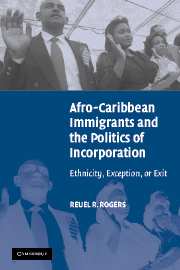Book contents
- Frontmatter
- Contents
- List of Tables
- List of Illustrations
- Acknowledgments
- Strangers at the Gate: Immigrant Political Incorporation in a New Century
- 1 Beyond Black and White: Theories of Political Incorporation
- 2 “Good” Blacks and “Bad” Blacks?
- 3 Letting Sleeping Giants Lie
- 4 Afro-Caribbeans and African Americans: Racially Bound or Ethnically Splintered?
- 5 Afro-Caribbean Sojourners: Home Country Ties and the Hope of Return
- 6 Black Like Who? Afro-Caribbean Immigrants, African Americans, and the Politics of Group Identity
- 7 Black Ethnic Options
- Conclusion: Reconsidering Political Incorporation and Race
- Appendix A Methodology
- Appendix B Interview Schedules
- Bibliography
- Index
5 - Afro-Caribbean Sojourners: Home Country Ties and the Hope of Return
Published online by Cambridge University Press: 07 November 2009
- Frontmatter
- Contents
- List of Tables
- List of Illustrations
- Acknowledgments
- Strangers at the Gate: Immigrant Political Incorporation in a New Century
- 1 Beyond Black and White: Theories of Political Incorporation
- 2 “Good” Blacks and “Bad” Blacks?
- 3 Letting Sleeping Giants Lie
- 4 Afro-Caribbeans and African Americans: Racially Bound or Ethnically Splintered?
- 5 Afro-Caribbean Sojourners: Home Country Ties and the Hope of Return
- 6 Black Like Who? Afro-Caribbean Immigrants, African Americans, and the Politics of Group Identity
- 7 Black Ethnic Options
- Conclusion: Reconsidering Political Incorporation and Race
- Appendix A Methodology
- Appendix B Interview Schedules
- Bibliography
- Index
Summary
Chapter 3 noted Afro-Caribbean elites complain their constituents are akin to a sleeping giant, because so many have been slow to become citizens and participate in formal politics. But the immigrants were jarringly awakened from their slumber in 1996. New York's Afro-Caribbean neighborhoods were suddenly abuzz with frenzied talk of American citizenship. Afro-Caribbean politicians urged eligible constituents to file naturalization papers. Community newspapers, such as the Carib News, featured articles on the imperatives of becoming an American citizen. Alongside these were the daily print ads for advocacy groups established to help immigrants acquire citizenship. Finally, there were also weekly stories tallying the scores of Caribbean immigrants flooding to Immigration and Naturalization Service (INS) centers and legal offices to file their petitions.
As I sat in the cramped Queens office of Caribbean Immigrant Services (CIS) on a brisk autumn afternoon, a steady stream of immigrants arrived in search of help with their applications. All around Brooklyn and Queens, the word was on the street: “Did you file your naturalization papers yet?” In small circles of friends, Afro-Caribbeans called each other to find out who had filed, who had not, and where to find legal help with their applications. There were ready remonstrations for those who had not, and relieved commendations for those who had. It is no exaggeration to say New York's Afro-Caribbean community was consumed with the idea of American citizenship in the summer and fall of 1996.
- Type
- Chapter
- Information
- Afro-Caribbean Immigrants and the Politics of IncorporationEthnicity, Exception, or Exit, pp. 145 - 169Publisher: Cambridge University PressPrint publication year: 2006



